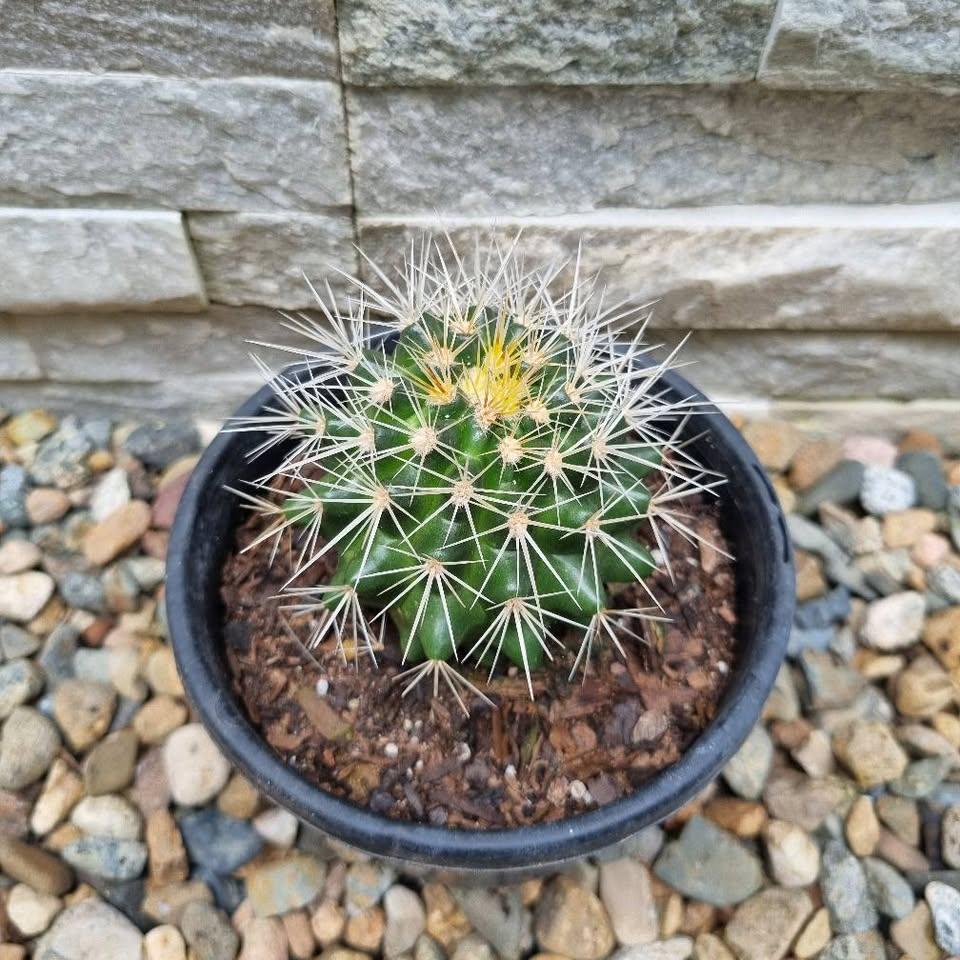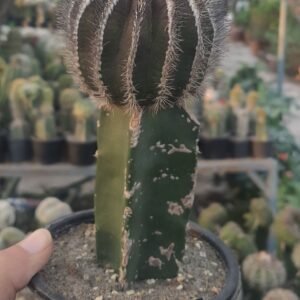White Barrel Cactus “🌵🤍The Ghostly Jewel of the Desert
The White Barrel Cactus is an exceptional, ornamental variety of barrel cactus characterized by its chalky white or silvery spines, giving it a ghostly, elegant appearance. While most commonly, the term refers to a pale-spined form of Echinocactus grusonii (Golden Barrel Cactus) or certain Ferocactus species with naturally white spines, it can also apply to specialty cultivars bred for their striking coloration.
This cactus is a perfect addition to xeriscapes, succulent collections, and modern landscapes, appreciated for its architectural symmetry, drought resistance, and low maintenance needs.
🌿 Botanical Overview
Scientific Name: Typically Echinocactus grusonii (white spine form) or Ferocactus glaucescens
Common Names: White Barrel Cactus, Snow Barrel Cactus, Ghost Barrel
Family: Cactaceae
Origin: Mexico (semi-arid zones)
Type: Perennial, slow-growing cactus
Size:
Height: 1–3 feet (30–90 cm)
Diameter: 1–3 feet (30–90 cm)
Ribs: 20–30 distinct, vertical ribs
Spines: Densely packed, white to silvery-grey, thick and prominent
Flowers: Yellow, orange, or pale hues depending on species, blooming at the crown
Bloom Time: Summer, though often only after several years of growth
☀️ Sunlight and Temperature Needs
Sunlight:
Requires full sun for best growth — 6 to 8 hours daily
Indoors: place in the brightest window, preferably south-facing
Can tolerate partial shade but may lose compact shape
Temperature:
Optimal range: 20°C to 35°C (68°F to 95°F)
Tolerates cold down to –6°C (20°F) if kept completely dry
Suitable for USDA Zones 9b–11
☀️ Adequate sun exposure maintains the cactus’s compact form and vibrant spine coloration.
💧 Watering Routine
Growing Season (Spring to Early Fall):
Water deeply but infrequently — every 2–4 weeks, ensuring the soil is completely dry between watering
Use the soak-and-dry method
Winter Dormancy:
Water sparingly (once every 6 weeks) or not at all if temperatures drop below 10°C (50°F)
💧 Overwatering is the main threat, leading to root rot. Always prioritize well-draining soil.
🌱 Soil Requirements
Type:
Use a cactus or succulent mix with extra coarse materials like:
Pumice
Perlite
Coarse sand
Alternatively, mix:
50% cactus mix
25% coarse sand
25% pumice or gravel
pH: Slightly acidic to neutral (6.0 to 7.5)
Good drainage is crucial to prevent moisture buildup and rot.
🌾 Fertilizer Schedule
Active Growth (Spring to Summer):
Apply a low-nitrogen cactus fertilizer (e.g., 5-10-10) every 6–8 weeks
Alternatively, use a diluted liquid fertilizer once a month
Winter:
No fertilizer needed during dormancy
Over-fertilization can cause unnatural growth or weaken the cactus.
✂️ Pruning and Maintenance
Pruning:
Not necessary except for removing dried flowers or damaged spines
General Maintenance:
Gently brush dust off the spines with a soft brush
Rotate pots occasionally for even light exposure
Use protective gloves when handling due to sharp spines
🌿 Propagation
By Seed:
Most common and effective method
Germination requires warmth, moisture, and patience — typically 3 to 6 weeks
By Offsets:
Some species (like Ferocactus glaucescens) may produce offsets that can be removed and replanted
Allow offsets to callous for a few days before planting
🐛 Pests and Problems
Common Pests:
Mealybugs
Scale insects
Spider mites in dry indoor conditions
Diseases:
Root rot from poor drainage
Fungal infections in high humidity
🛡️ Use neem oil or insecticidal soap for pests. Prevent disease with dry, airy conditions.
🌵 Landscaping and Decorative Uses
Great For:
Desert landscapes and rock gardens
Indoor decorative pots (with adequate sunlight)
Modern or minimalistic designs for striking texture and form
Xeriscaping due to low water needs
Companion Plants:
Pair with Agave, Aloe, Yucca, or Golden Barrel Cactus for color and textural contrast
📸 The white spines make this cactus highly photogenic, especially when paired with darker or colorful backgrounds.
✅ Conclusion
The White Barrel Cactus is an eye-catching, hardy, and low-maintenance succulent ideal for cactus enthusiasts, modern landscapers, and collectors alike. Its ghostly spines, combined with a classic barrel shape, provide year-round architectural interest with minimal effort.
With proper care — focusing on bright light, minimal water, and perfect drainage — your White Barrel Cactus can live for decades, growing slowly into a magnificent, sculptural specimen.”





Reviews
There are no reviews yet.